 Pedro Mocho. The Dinosaur Institute, Natural History Museum of Los Angeles County, 900 Exposition Blvd., 90007 CA, Los Angeles, USA; Grupo de Biología Evolutiva, Facultad de Ciencias, UNED, c/ Senda del Rey, 9, 28040 Madrid, Spain; Laboratório de Paleontologia e Paleoecologia, Sociedade de História Natural, Polígono Industrial do Alto do Ameal, Pav.H02 e H06, 2565-641, Torres Vedras, Portugal. pmocho@nhm.org
Pedro Mocho. The Dinosaur Institute, Natural History Museum of Los Angeles County, 900 Exposition Blvd., 90007 CA, Los Angeles, USA; Grupo de Biología Evolutiva, Facultad de Ciencias, UNED, c/ Senda del Rey, 9, 28040 Madrid, Spain; Laboratório de Paleontologia e Paleoecologia, Sociedade de História Natural, Polígono Industrial do Alto do Ameal, Pav.H02 e H06, 2565-641, Torres Vedras, Portugal. pmocho@nhm.org
Dr. Pedro Mocho is a geologist who did his undergraduate studies at the Universidade de Lisboa (Portugal) and received his M.Sc. in Biodiversity and his Ph.D. in Biology from the Universidad Autónoma de Madrid in 2016, under the supervision of Dr. Francisco Ortega and Dr. Rafael Royo-Torres. He is now a Postdoctoral Research Associate in the Dinosaur Institute of the Natural History Museum of Los Angeles County. His main research is focused on the evolutionary history of sauropod dinosaurs, in particular the phylogenetic context of the Upper Jurassic sauropods of the Iberian Peninsula (Portugal and Spain) and North America (USA). In the Dinosaur Institute, he is working on the systematics and paleobiology of the sauropods from the "Gnatalie" quarry (Upper Jurassic, Utah) and from the Bisti/De-Na-Zin Wilderness (Upper Cretaceous, New Mexico). He is also studying Middle Jurassic sauropods from Africa and the evolution of Titanosauriforms during the Early and Upper Cretaceous, including new research on several forms from Spain, North America, and Africa. He is collaborating on different paleontological research and outreach projects in Spain, Portugal, and the United States. His research is especially focused on the evolutionary history of non-neosauropod eusauropods, the Upper Jurassic diversification of neosauropods and in the evolutionary history of european titanosars. His research has taken him on several national and international expeditions in Western Portugal, Utah, New Mexico, and Spain. He is also member of the Grupo de Biología Evolutiva, UNED (Spain) and Sociedade de História Natural (Torres Vedras, Portugal).

 Rafael Royo-Torres. Fundación Conjunto Paleontológico de Teruel-Dinópolis/Museo Aragonés de Paleontología, av. Sagunto s/n. E-44002 Teruel, Spain. royo@dinopolis.com
Rafael Royo-Torres. Fundación Conjunto Paleontológico de Teruel-Dinópolis/Museo Aragonés de Paleontología, av. Sagunto s/n. E-44002 Teruel, Spain. royo@dinopolis.com
Rafael Royo Torres received his PHD in 2006 at Facultad de Ciencias of the Zaragoza University (Departamento Ciencias de la Tierra) Spain. He has been working like paleontologist of the Fundación Conjunto Paleontológico de Teruel-Dinópolis since 1998 for the Dinopolis project in Spain. His main research interests are the phylogeny and evolution of sauropod dinosaurs, in particular of the Late Jurassic and Early Cretaceous faunas from the Spain, France and Portugal, respectively, where he also participated in various excavation campaigns. He has produced more than 50 publications in scientific journals, being first author in journals such as Science, where Turiasaurus riodevensis was defined in 2006. He is currently involved in I+D+I projects of the Spain Goverment and co-manages several dissertations of dinosaurs from Spain.

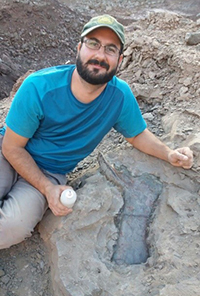 Fernando Escaso. Grupo de Biología Evolutiva, Facultad de Ciencias, UNED, c/ Senda del Rey, 9, 28040 Madrid, Spain; Laboratório de Paleontologia e Paleoecologia, Sociedade de História Natural, Polígono Industrial do Alto do Ameal, Pav.H02 e H06, 2565-641, Torres Vedras, Portugal. fescaso@ccia.uned.es
Fernando Escaso. Grupo de Biología Evolutiva, Facultad de Ciencias, UNED, c/ Senda del Rey, 9, 28040 Madrid, Spain; Laboratório de Paleontologia e Paleoecologia, Sociedade de História Natural, Polígono Industrial do Alto do Ameal, Pav.H02 e H06, 2565-641, Torres Vedras, Portugal. fescaso@ccia.uned.es
Fernando Escaso is an Assistant Professor at the Science Faculty of the Universidad de Educación a Distancia (UNED), Spain. His research is focused in the evolutionary history of the ornithischian dinosaurs from the Late Jurassic of the Iberian Peninsula and their relationships with the synchronous faunas of Laurasia. Also, other research interest are the study of the ornithopod dinosaur faunas from the Cretaceous of southwestern Europe.

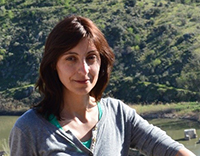 Elisabete Malafaia. Instituto Dom Luiz, Universidade de Lisboa. Edifício C6, Campo Grande, 1749-016 Lisboa, Portugal; Museu Nacional de História Natural e da Ciência, Rua da Escola Politécnica 56/58, 1250-102 Lisboa, Portugal; Laboratório de Paleontologia e Paleoecologia, Sociedade de História Natural, Polígono Industrial do Alto do Ameal, Pav.H02 e H06, 2565-641, Torres Vedras, Portugal. emalafaia@gmail.com
Elisabete Malafaia. Instituto Dom Luiz, Universidade de Lisboa. Edifício C6, Campo Grande, 1749-016 Lisboa, Portugal; Museu Nacional de História Natural e da Ciência, Rua da Escola Politécnica 56/58, 1250-102 Lisboa, Portugal; Laboratório de Paleontologia e Paleoecologia, Sociedade de História Natural, Polígono Industrial do Alto do Ameal, Pav.H02 e H06, 2565-641, Torres Vedras, Portugal. emalafaia@gmail.com
Elisabete Malafaia started the PhD at Faculdade de Ciências da Universidade de Lisboa in 2012. Your main research interests are the phylogeny and evolution of theropod dinosaurs. She is interested in particular in the paleobiogeographic evolution of the Late Jurassic faunas from Portugal and its relationships with other correlative faunas of the peri-Atlantic context.

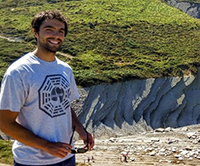 Carlos de Miguel Chaves. Grupo de Biología Evolutiva, Facultad de Ciencias, UNED, c/ Senda del Rey, 9, 28040 Madrid, Spain. carlos.miguelchaves@gmail.com
Carlos de Miguel Chaves. Grupo de Biología Evolutiva, Facultad de Ciencias, UNED, c/ Senda del Rey, 9, 28040 Madrid, Spain. carlos.miguelchaves@gmail.com
Carlos de Miguel Chaves graduated in the Universidad Autónoma de Madrid with a bachellor's degree in Biology in 2012, and he studied a master's degree in Evolutionary Biology at the Universidad Complutense de Madrid. In 2014 he joined the Group of Evolutionary Biology at the National University of Distance Education (UNED), where he curses his PhD studies. His work focus on the fossil record of Triassic sauropterygian reptiles from the Iberian Peninsula.

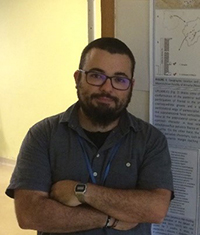 Iván Narváez. Grupo de Biología Evolutiva, Facultad de Ciencias, UNED, c/ Senda del Rey, 9, 28040 Madrid, Spain. i.narvaez.padilla@gmail.com
Iván Narváez. Grupo de Biología Evolutiva, Facultad de Ciencias, UNED, c/ Senda del Rey, 9, 28040 Madrid, Spain. i.narvaez.padilla@gmail.com
Iván Narváez received his MSc on paleontology in the Universidad Complutense de Madrid in 2009 and his PhD in Biology in Universidad Autónoma de Madrid in 2015, under the supervision of Francisco Ortega and Christopher A. Brochu. His research is focused on the study of the evolutionary history of the basal Eusuchian crocodiles from the Late Cretaceous of Europe and the phylogenetic relationship of these groups with synchronous faunas in Laurasia. In addition, he is interested on the study of dinosaur diversity from Iberian Peninsula.

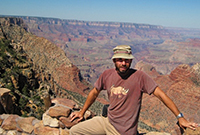 Adán Pérez-García. Grupo de Biología Evolutiva, Facultad de Ciencias, UNED, c/ Senda del Rey, 9, 28040 Madrid, Spain; Laboratório de Paleontologia e Paleoecologia, Sociedade de História Natural, Polígono Industrial do Alto do Ameal, Pav.H02 e H06, 2565-641, Torres Vedras, Portugal. paleontologo@gmail.com
Adán Pérez-García. Grupo de Biología Evolutiva, Facultad de Ciencias, UNED, c/ Senda del Rey, 9, 28040 Madrid, Spain; Laboratório de Paleontologia e Paleoecologia, Sociedade de História Natural, Polígono Industrial do Alto do Ameal, Pav.H02 e H06, 2565-641, Torres Vedras, Portugal. paleontologo@gmail.com
Adán Pérez-García is a paleontologist working on several clades of reptiles, mainly on Testudinata. He obtained his PhD on the fossil turtles from the Iberian Peninsula in 2012, at the Universidad Complutense de Madrid. He is now a researcher at the Universidad Nacional de Educación a Distancia (Madrid). His main work focuses on the study of the systematics, paleobiogeography and diversity of Mesozoic and Cenozoic faunas of turtles from the Jurassic to the Holocene, including both European and African clades. He described several new taxa corresponding to pan-pleurodiran and pan-cryptodiran forms.

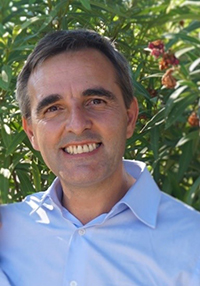 Nuno Pimentel. Instituto Dom Luiz, Universidade de Lisboa, edifício C6, Campo Grande, 1749-016 Lisboa, Portugal. pimentel@fc.ul.pt
Nuno Pimentel. Instituto Dom Luiz, Universidade de Lisboa, edifício C6, Campo Grande, 1749-016 Lisboa, Portugal. pimentel@fc.ul.pt
Nuno Pimentel received his PhD in Sedimentology and Stratigraphy at the Lisbon University. His main research interest is the evolution of sedimentary basins, including lithostratigraphic, palaeogeographic and geodynamic issues. In this last decade he focused the research in the Lusitanian Basin, Western Portugal, addressing its evolution and also its petroleum systems. He has meanwhile collaborated with paleontologists in reconstructing depositional palaeoenvironments, namely for the Upper Jurassic formations of the Lusitanian Basin.

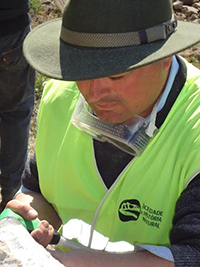 Bruno C. Silva. Laboratório de Paleontologia e Paleoecologia, Sociedade de História Natural, Polígono Industrial do Alto do Ameal, Pav.H02 e H06, 2565-641, Torres Vedras, Portugal. bcsilva.paleo@gmail.com
Bruno C. Silva. Laboratório de Paleontologia e Paleoecologia, Sociedade de História Natural, Polígono Industrial do Alto do Ameal, Pav.H02 e H06, 2565-641, Torres Vedras, Portugal. bcsilva.paleo@gmail.com
Bruno Camilo Silva has a vast experience in heritage management, having started his first palaeontological excavations of fossil vertebrates in 1995. Since then, he has promoted several works of intervention and salvage in palaeontological sites of the Portuguese Upper Jurassic western coast in general and in the Municipality of Torres Vedras, in particular. He is currently director of the Paleontology and Paleoecology Laboratory of the Natural History Society (Torres Vedras, Portugal), where he is responsible for the collections. In the scope of this collections he co-coordinates the Geographic Information System Applied to Paleontology, developed by the Geographic Information Department of the Natural History Society. His main interests are the management of palaeontological heritage and the palaeobiology of archosaurs of the Upper Jurassic.

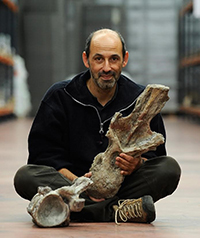 Francisco Ortega. Grupo de Biología Evolutiva, Facultad de Ciencias, UNED, c/ Senda del Rey, 9, 28040 Madrid, Spain; Laboratório de Paleontologia e Paleoecologia, Sociedade de História Natural, Polígono Industrial do Alto do Ameal, Pav.H02 e H06, 2565-641, Torres Vedras, Portugal. fortega@ccia.uned.es
Francisco Ortega. Grupo de Biología Evolutiva, Facultad de Ciencias, UNED, c/ Senda del Rey, 9, 28040 Madrid, Spain; Laboratório de Paleontologia e Paleoecologia, Sociedade de História Natural, Polígono Industrial do Alto do Ameal, Pav.H02 e H06, 2565-641, Torres Vedras, Portugal. fortega@ccia.uned.es
PhD in Biology (Paleontology) and Professor at the Faculty of Sciences of UNED (Madrid) in which he teaches in subjects related to biodiversity to student of Environmental Sciences. He is also the IP of the Evolutionary Biology Research Group-UNED, focusing his work on the analysis of the evolutionary history of Mesozoic reptiles, especially crocodiles and dinosaurs, and the ecosystems in which they inhabited. He is the author of more than a hundred publications in scientific and technical journals that mainly focused in the Late Jurassic of the Lusitanian Basin (Portugal), and the Cretaceous from the Spain (Las Hoyas, Lo Hueco and Morella fossil sites among others). In the field of paleontological heritage management has been a curator of the collections of paleontology of the Museum of Sciences of Castilla-La Mancha in Cuenca. He has also been involved in the generation of museum and museographic projects in Spain and Portugal. He has participated in different research paleontological projects in Spain, Portugal, Niger, Argentina and the United States, which implies being part of almost one hundred excavations and some dozens of national and international research projects. more: http://www.biouned.com/personal/fortega/

